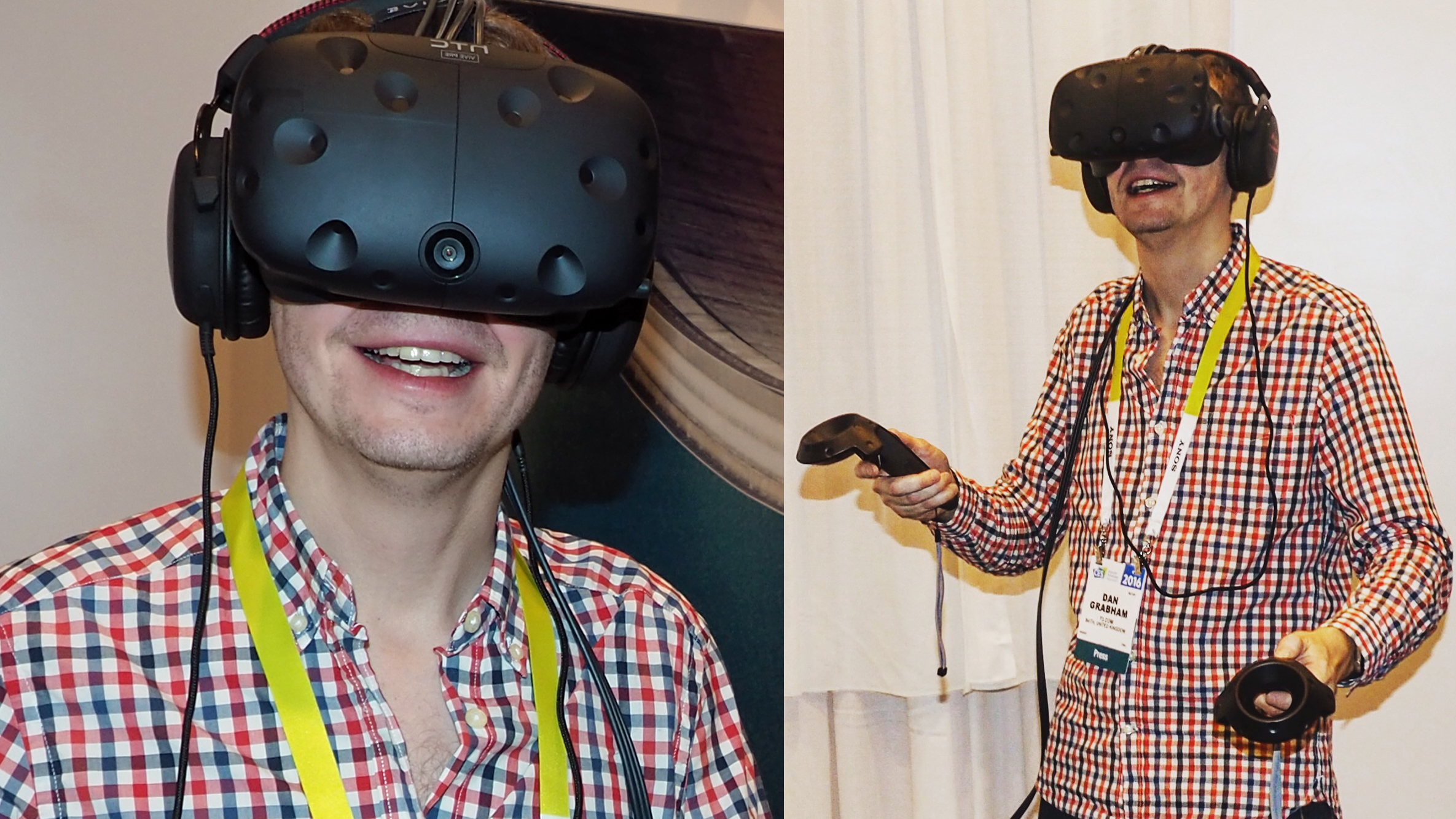
Virtual reality (VR) is the big tech story of 2016. But seriously, are you thinking of buying? The fact is that the lower end VR - LG 360, Google Cardboard, even Samsung's Gear VR - is an experience somewhere between adequate and awful, while the pricing of the Oculus Rift and HTC Vive is simply too high for most punters.
Now that pre-orders are up and running, we know that Oculus Rift is priced at $600/£500, without the 3D controllers that are a necessary part of the experience. HTC Vive is $799/£689, although that includes controllers and that system's Kinect-style body tracking hardware.
Just to be clear, I'm not saying either system isn't worth its price (certainly, I'd say you'd be nuts as an individual to pay $3,000 for Microsoft's AR competitor, HoloLens, but that is far more of a business-level device). Vive and Rift are both reasonably priced, for what you get.
However, what you get is so cutting edge by consumer standards - and hence expensive - that I just don't think that the level of take-up will be huge. It certainly won't be enough to justify the hype that 2016 is 'The Year of VR'. Any more than last year justified its tag of 'Year of the Wearable' (in fact if anything, I'd say last year saw us hit Peak Wearable, when the Apple Watch appeared, did alright, but failed to ignite the sector as many had hoped. But that's one for another blog).
There's not enough players
This guy looks pretty happy with his HTC Vive, right? That's because he's got a fairly powerful, up-to-date PC. But the number of guys, like Dan, with a recently upgraded GPU and enough CPU power and RAM is smaller than you might think.

Fact is, the potential user base for PC VR is big, but not huge. According to an Nvidia statement to VentureBeat.com last year, only 13 million PCs worldwide are powerful enough to run VR in a way that is properly impressive. Admittedly, you can run VR on lower-specced PCs, but the fall-off in wow factor is pretty abrupt.
Valve's Steam survey of PCs connected to its networks - which will include Vive's platform of choice, SteamVR - tells a similar story. Only about 20% have an eight-bit processor running at 3.3GHz or more and only a small percentage have an Nvidia GTX970 or higher - that's the preferred CPU and GPU for Oculus Rift. Almost half are only rocking a dual-core CPU, in fact. As am I, now I think about it. So no VR for me…
Sign up to the T3 newsletter for smarter living straight to your inbox
Get all the latest news, reviews, deals and buying guides on gorgeous tech, home and active products from the T3 experts
Now obviously, if I thought all 13 million people who own a PC able to run VR were to rush out and buy a headset, I wouldn't be writing this. I think the take-up will be a FAR smaller percentage. That's for a number of reasons.
First up, I'd say Oculus, although less impressive, will perform better than Vive. That's because life is unfairm but ironically, that's also because Vive's USP - that it can also track your body movements within a room - also makes it more off-putting to most people. Not you and me, you understand; we're cool.
'Most people' don't have a powerful PC in the front room, or a dedicated games room, and they immediately picture destroyed coffee tables and sprained ankles when thinking about that kind of motion tracking. It doesn't matter if that's fair or not, it's just what they think.
Early adopters only
Vive-specific issues aside, when considering VR, I think the bulk of potential consumers will be put off by the following:
1. Mediocre experiences with older and/or cheaper VR products. Cardboard and 360 VR are little more than fun novelties. And until mobile screens get so high-resolution that they're actually ridiculously over-specced for other mobile uses, even Gear VR or Zeiss One will be like a Megadrive version of virtual reality. Only the expensive headsets give the full experience. And anyone who remembers VR 1.0, Lawnmower Man and Virtual Boy will need a lot of enticing back.
2. Worries about motion sickness. This one is not going to go away. I've seen people put on an Oculus Rift when the demo is just them, totally stationary, in an empty field, and they've immediately gone, "Oh, I'm gonna be sick." The fear of motion sickness will put off even those who aren't susceptible to it, and telling them, "You get used to it," doesn't really wash if you have to pay £500 to find out if that's true.
3. The bulk of the headsets, and the fact they have to be wired at present. Both these things are unavoidable; both make headsets a hard sell as gaming accessories. If you bought a Sony Move or an extra controller, while you weren't using them, they'd sit happily in any drawer, or behind the telly, or wherever. Vive and Oculus are not so stowable.
Because of the amount of data that needs to be chucked about, with near-zero latency, the wires are currently unavoidable. But they do make setup problematic, and with the full body immersion of Vive, they are liable to get wrapped around your legs, at least until you're used to it.
4. Above all, it's the price. £500 to nearly £700 for what is, when all is said and done, a gaming accessory, is just too much for most customers.
Yes, PC VR can be a great thing. It'll be widely used at events and for marketing in 2016. Outlying factors such as the inevitable boom in VR porn will give it a helping hand… But it won't lead to a happy finish.
Can PlayStation crack it?
So the early success of VR could come down to Sony's PlayStation VR.
Thanks to PS4's success, this has a potential user base of 36 million and counting, all with exactly the same specced device. It's solely and specifically for gaming - Sony's sweet-scented, walled garden means devs won't be making experiential marketing apps for Audi on it, and porn is well off the menu.
However, Sony has only a middling record when it comes to accessories. It didn't make a stellar success of PlayStation Move, for instance. Sure, that ticked along, and there were some decent titles for it, but Sony never really persuaded enough developers to create content for it. There was Counter Strike, Resident Evil and Get Fit With Mel B, but no Call of Duty, Uncharted or Metal Gear.
With announcements on PS VR due at GDC in two weeks, there's a chance we might learn the price. Does Sony want to lose money on a VR headset? Of course not; why should it?
For that reason, I reckon the pricing is likely to be in line with Oculus Rift, and as a result, it's likely to be a slow-burning, cult accessory, not a mass-market sensation.
Let's pick this up again in 2017…
Liked this? Check out VR headset showdown: HTC Vive vs Oculus Rift vs PlayStation VR
Duncan is the former lifestyle editor of T3 and has been writing about tech for almost 15 years. He has covered everything from smartphones to headphones, TV to AC and air fryers to the movies of James Bond and obscure anime. His current brief is everything to do with the home and kitchen, which is good because he is an excellent cook, if he says so himself. He also covers cycling and ebikes – like over-using italics, this is another passion of his. In his long and varied lifestyle-tech career he is one of the few people to have been a fitness editor despite being unfit and a cars editor for not one but two websites, despite being unable to drive. He also has about 400 vacuum cleaners, and is possibly the UK's leading expert on cordless vacuum cleaners, despite being decidedly messy. A cricket fan for over 30 years, he also recently become T3's cricket editor, writing about how to stream obscure T20 tournaments, and turning out some typically no-nonsense opinions on the world's top teams and players.
Before T3, Duncan was a music and film reviewer, worked for a magazine about gambling that employed a surprisingly large number of convicted criminals, and then a magazine called Bizarre that was essentially like a cross between Reddit and DeviantArt, before the invention of the internet. There was also a lengthy period where he essentially wrote all of T3 magazine every month for about 3 years.
A broadcaster, raconteur and public speaker, Duncan used to be on telly loads, but an unfortunate incident put a stop to that, so he now largely contents himself with telling people, "I used to be on the TV, you know."

